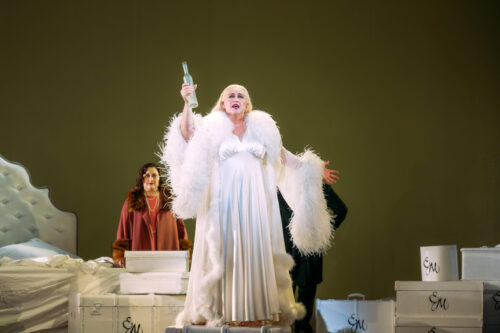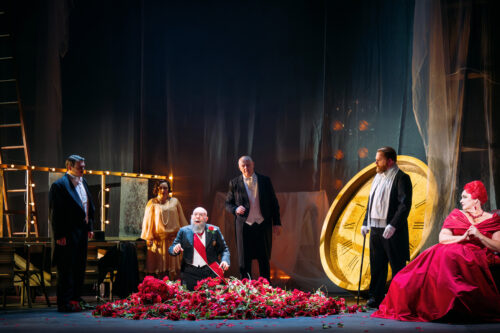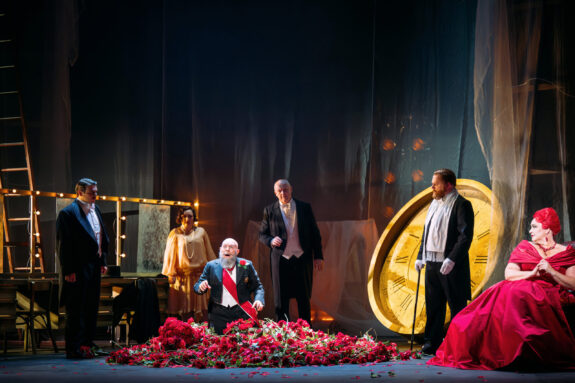 United Kingdom Janáček, The Makropulos Affair: Soloists, The Orchestra of Scottish Opera and The Chorus of The Makropulos Affair / Martyn Brabbins (conductor). Theatre Royal Glasgow, 19.2.2025. (GT)
United Kingdom Janáček, The Makropulos Affair: Soloists, The Orchestra of Scottish Opera and The Chorus of The Makropulos Affair / Martyn Brabbins (conductor). Theatre Royal Glasgow, 19.2.2025. (GT)

Scottish Opera – especially under Sir Alexander Gibson – has long proved steadfast interpreters of Leoš Janáček’s stage works. Most notably, his masterpieces of Jenůfa, The Cunning Little Vixen and Katya Kabanová have won popularity among audiences for the tragic and life-enhancing vibrancy of his operas. The first time that The Makropulos Affair was heard in Scotland was when the Prague National Theatre visited the Edinburgh International Festival in 1970 (when they also introduced The Excursions of Mr Brouček, and Smetana’s Dalibor and The Bartered Bride). Scottish Opera staged The Makropulous Affair under Sir Richard Armstrong in a production by David Pountney and designs by Maria Bjørnson in 1981. This co-production with the Welsh National Opera was first performed in Cardiff in October 2022.
The director Olivia Fuchs explains the personality and plight of the opera’s heroine: ‘Emilia Marty, suffers from the “affliction” of having lived for over three hundred years. In 1585, as a 16-year-old girl originally called Elina Makropulos, she was given a potion that would prolong her life; since then, she has had to fend for herself, reinventing herself every few decades, taking on new names but always using the initials E.M. Emilia Marty is both victim and perpetrator, femme fatale and abused young girl. She has lived so many variations of her life, exploring new identities in different contexts across the centuries, that she has become world-weary and alienated from life and from other people, seemingly losing her heart in the process. However, she is also a deeply sensitive and fragile human being who shows her vulnerability in the final part of the opera.’
The opening was stunning – projecting a visual representation of Emilia Marty’s life in a surreal image of the 347-year-old singer heard against the vitally rich rhythms of Janáček’s score. The screen rose, and we saw the law offices of Doctor Kolenatý, set in the timeframe of the twenties of the last century. Everywhere around are the piles of legal documents and desks. An attractive visual trick was the rising in columns of all these legal papers above the stage as the Emilia Marty case was first raised – it produced a coup de théâtre. The story of the centuries-old case of Gregor versus Prus was described well with the sensitive issue of the all-important inheritance being judged in the Prus family’s favour. Emilia Marty, however, informs of an unknown will that transforms everything. She says that ‘Pepi’ fathered illegitimately Ferdinand Gregor. The charms of the opera star Marty captivate Albert Gregor – in response to his proposition – she asks for an old Greek document which proves everything. During the pause between Acts I and II, we heard the playing on an old record player of an excerpt from an unfinished ‘Dunaj’ (‘The Danube’) Symphony by Janáček and amusingly portrayed by Kristina and Count Hauk-Šendorf.
In Act II, we are in Emilia Marty’s dressing room after her opera performance, where Janek falls under her spell. Yet, the old beau Count Hauk-Šendorf recounts that Emilia is a double of Eugenia Montez – an old lover from fifty years previously. In a superbly comic scene, she removes her scarlet red skirt and like a bullfighter, she coaxes the old man to try and take her by swirling the red dress before him. He is rivalled by the attentions of Vitek and Prus, who question the initials EM, which match those of the past, namely Ellian MacGregor or Elina Makropulous – the mother of Prus’ son, Joseph Ferdinand. Dismissing all her potential lovers, Marty persuades Janek to get the Greek document for her, but his father stops this by asking her to sleep with him in return for the document.
Act III opens in Emilia’s bedroom, and as Prus attempts to take her, she cries out, ‘Where is it?’ – a funny moment as he appears impotent and unable to make love, but she wants the promised legal document, which at last the frustrated Prus gives her. Yet now, after hearing of the tragedy of Janek’s suicide, Doctor Kolenatý, Gregor, Vitek and Kristina arrive, accusing her of forging the document. At last, Marty recounts her life and how she took a magical potion which gave her everlasting life. She now voices her burden of eternal life and the perpetual abusive treatment by oversexed men and of disappointment in not finding genuine happiness. She is exhausted and desires an end to it all; she retires to her bed – and after taking the magical potion, raising her arms aloft, she dies, in a dramatically powerful climax enhanced by the brass ensemble playing from high above the auditorium.

Of the singers, the most outstanding was Orla Boylan as Emilia Marty – rarely have I seen such a comprehensive realisation of this complex role – she completely assumed the character of the ageless singer – surely one of the most challenging parts in all opera. She just got better and better – finishing in a desperately powerful climax, and with her faultless singing, was always in control of her tragic role.
The Albert Gregor of Ryan Capozzo – making his Scottish Opera debut – was in character and exhibited a fine tenor, often with a warmth of emotion. Another impressive performance was Alasdair Elliot as Count Hauk. Elliot – both in voice and sheer charisma – brought out all the humour of his role. The Baron Jaroslav Prus of Roland Wood was brilliant in evincing mischief and lust by using his wealth and power against the tragic Emilia Makropulos. His robust baritone was an asset of the show – revealing both colour and subtle nuances. The Janek of Michael Lafferty – another debut here – was impressive and exhibited both promise in his singing and acting. Catriona Hewitson’s Kristina was marvellous both vocally and in characterisation, presenting the personality of the young singer who wants to emulate the famous opera singer Emilia Marty.
The orchestra were magnificent in bringing out all the greatness of Janáček’s score. Some of the woodwind solos were outstanding and the harmonies of the brass section – especially in the opera’s culmination – all superbly directed by Martyn Brabbins, amazingly making his debut at Scottish Opera after many years notably with the BBC Scottish Symphony Orchestra. He brought out colours and beauty unheard of here before; the clarity of expression was magnificent, evincing all the vibrancy of the music. The offstage choral singing was outstanding in creating an atmosphere and revealing the often fantasy element of the opera. David Pountney’s translation into English, in my opinion, was superfluous as Janáček wrote his score based on the rhythm of Moravian speech and specifically folk songs. Olivia Fuchs’s production was a colourful, entertaining spectacle with frequently comic moments bringing out all the wit of the composer’s libretto matched by the lively score and constantly brightened with jokes and silly double-entendre as evident in the original score and Karel Čapek’s play.
The idiosyncratic surrealistic design by Nicola Turner was another success, producing a marvellously attractive representation of this challenging opera, assisted by Robbie Butler’s visual direction and the lighting by Sam Sharples created a fairytale visual fantasy – beautiful to watch and enjoy – this was a remarkable triumph for Scottish Opera (in collaboration with Welsh National Opera) and following the last Glasgow performance on 22 February, it will be at the Edinburgh Festival Theatre on 27 February and 1 March.
Gregor Tassie
Production:
Director – Olivia Fuchs
Designer – Nicola Turner
Lighting designer – Robbie Butler
Video designer – Sam Sharples
Cast:
Emilia Marty – Orla Boylan
Albert Gregor – Ryan Capozzo
Doctor Kolenatý- Henry Waddington
Vítek – Mark Le Brocq
Kristina – Catriona Hewitson
Baron Jaroslav Prus – Roland Wood
Janek – Michael Lafferty
Count Hauk-Šendorf – Alasdair Elliott
Stage Technician / Doctor – Edward Jowle
Poklizecka – Heather Ireson
Komorna – Lea Shaw
